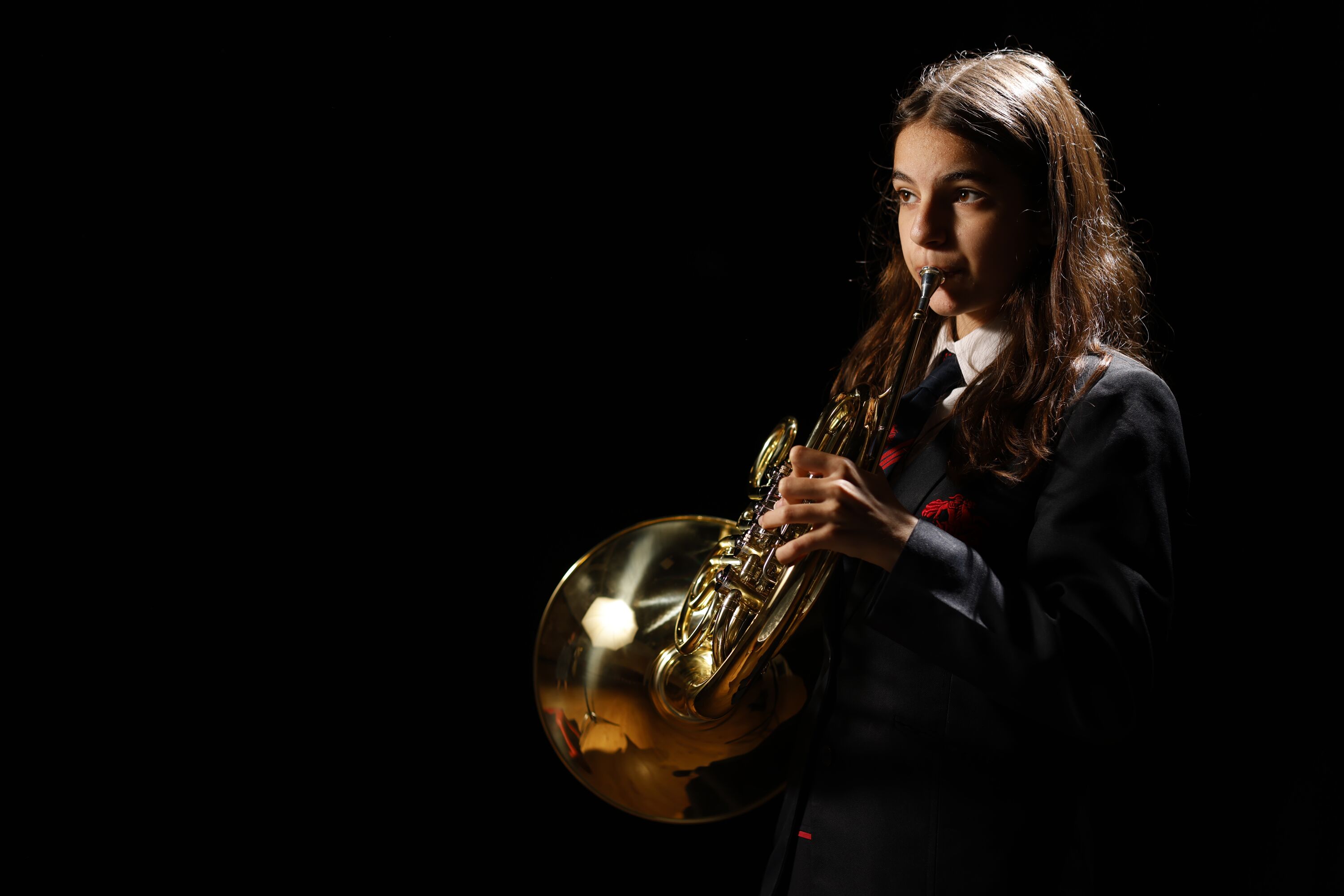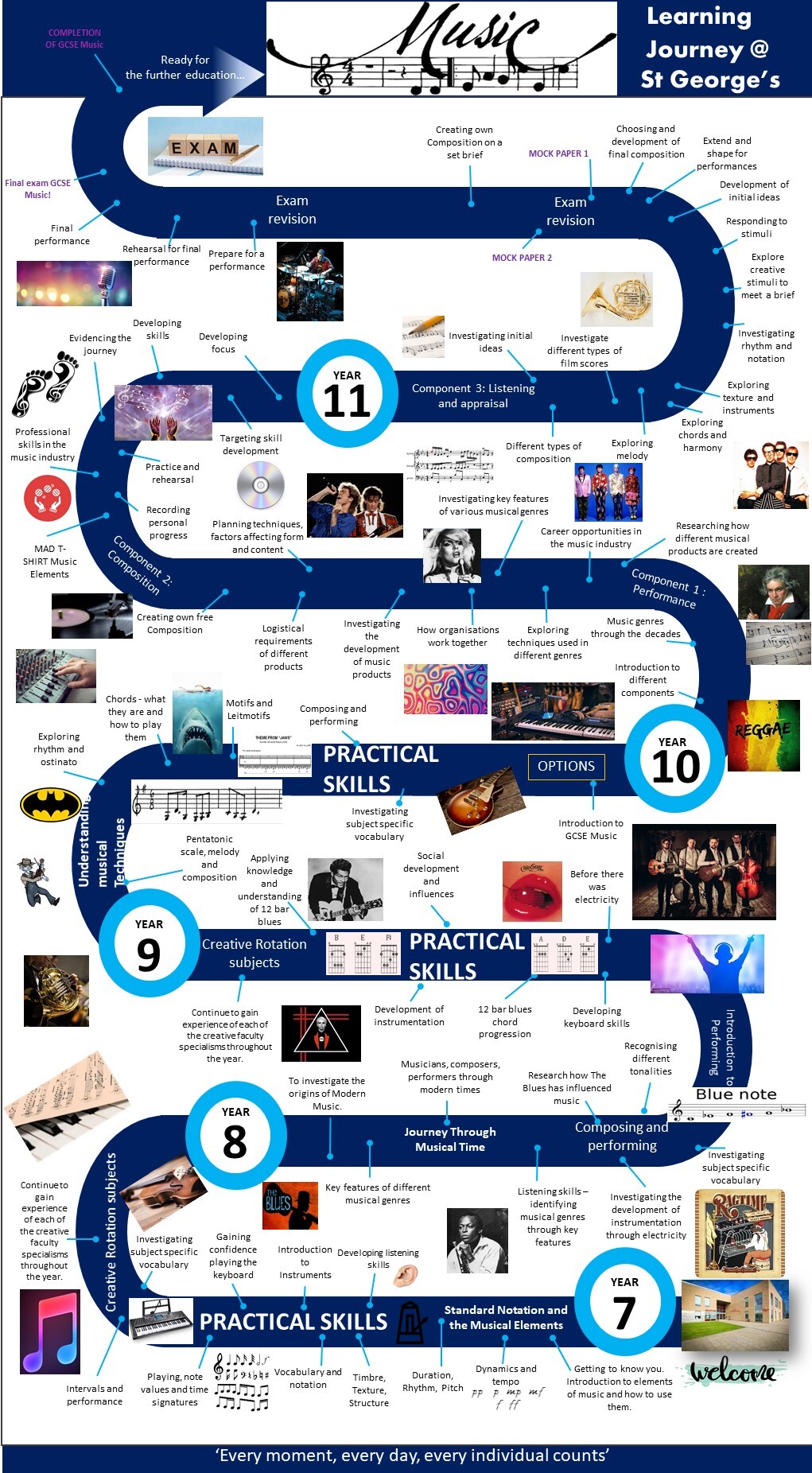Music (GCSE)

Music benefits pupils’ self-esteem, confidence, creativity and communication skills, St George’s pupils are actively engaged in developing the kinds of life skills that will enable them to become confident, expressive and creative citizens. You will learn about the music industry, roles and organisations within the industry; this includes careers such as a sound engineer, technician, backstage crew, journalist, talent scout or working for a union. You will create your own music product or concert; this will be presented to your target audience and real feedback will be offered. In addition to these skills you will learn about composition and will become a composer; you will also learn about performing and all the skills needed in order to create a performance to be proud of.
Instrumental lessons at Secondary.
Monday – guitar / singing / piano
Tuesday – guitar / woodwind / piano
Wednesday – violin
Thursday – singing / piano
Friday – drumming
Subject Vision
St George's provides a progressive curriculum that is adventurous and challenging, leading to resilience, curiosity and independence.
The GCSE Music curriculum aims to inspire and engage students in the study of music, develop their musical skills and interests, and foster a holistic understanding of music.
Adventurous - Students have opportunities to perform music with control, making expressive use of phrasing and dynamics appropriate to the style and mood of the music, as well as performing skills individually and in groups
Resilience –. Through music study, students learn the value of sustained effort to achieve excellence and the concrete rewards of hard work. Being able to learn from mistakes and challenges whilst being supported and encouraged will build self-confidence, self-belief and resilience.
Independence – Students are encouraged and supported to develop their composing skills to organise musical ideas and make use of appropriate resources, recognise links between the integrated activities of performing, composing and appraising and how this informs the development of music
Challenge – Studying Music provides a challenge to students as they need to be able to perform an instrument or sing to a high standard, as well as being able to create original musical pieces exploring a range of styles and genres
Curiosity – The GCSE Course in music provides an opportunity for students to broaden musical experience and interests, develop imagination and foster creativity develop knowledge, understanding and skills needed to communicate effectively as musicians
Community – Through studying music students have the opportunity to enhance their teamwork skills and discipline, as they develop compositions towards their final assessments
Our Learning Journey

Homework
Year 10 and 11 – set when required by class teacher
KS3 Subject Information
Check the Creative Rotation page - Click Here
GCSE Subject Information - KS4
Edexcel GCSE Music involves performing, composing, and appraising. Students will perform at least two pieces (solo and ensemble), compose two pieces (one to a brief, one free choice), and undergo a listening and appraising exam based on eight set works. The specification emphasizes musical elements, contexts, and language, requiring students to develop both practical and analytical skills
Key Components:
- Performing (30%):
Students must perform at least two pieces, one of which must be an ensemble performance. The total performance time should be at least 4 minutes.
- Composing (30%):
Students will compose two pieces: one in response to a brief set by the exam board and one free composition. The total composition time should be at least 3 minutes.
- Appraising (40%):
This involves a written exam where students analyze and evaluate unfamiliar music, as well as the set works
Revision
Job Opportunities / Careers
A GCSE in Music can open doors to various music-related careers, including performing, teaching, production, and more. It can also be a stepping stone to further education in music or other fields, developing valuable skills that are transferable to diverse professions.
Specific Career Paths:
- Performing & Recording: This includes becoming a musician, singer, songwriter, or opera singer.
- Music Production: Roles like record producer, sound engineer, audio engineer, and music mixer are involved in the technical and creative aspects of recording.
- Music Education: Options include becoming a music teacher at various levels, from private lessons to secondary school teaching.
- Music Therapy: This field uses music to help individuals with various challenges.
- Music Management & Promotion: Roles like talent agent, music manager, and music promotions manager are involved in the business side of the industry.
- Broadcasting & Radio: This includes radio producers, DJs, and radio broadcast assistants.
- Music Journalism & Writing: Music journalists and reporters cover the industry, write about music, and may work for publications or online platforms.
- Other Music-Related Roles: This includes concert management, musical instrument maker/repairer, and music supervisors in film and TV.
Useful Websites
Useful Websites for further information on careers and apprenticeships:
https://www.learnhowtobecome.org/arts-humanities-careers/music/
https://www.prospects.ac.uk/careers-advice/what-can-i-do-with-my-degree/music
Music Handout
See HERE


